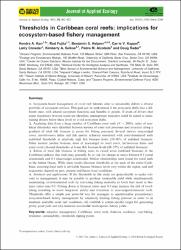/admin/item?itemID=47deb89a-5764-4689-bf34-edf98bfdd570
Thresholds in Caribbean coral reefs : implications for ecosystem-based fishery management

Ver/
Tipo de acceso
AbiertoTipo de Material
ArtículoTipo de Contenido
Investigación científicaIdioma
InglésAudiencia
Técnicos, profesionales y científicosColección
- Investigación ambiental [1693]
Metadatos
Mostrar el registro completo del ítem| Sinopsis: | This article describes how ecosystem-based fishery management can preserve coral reefs by preventing transitions to degraded states. Analyzing 2,001 Caribbean reefs, researchers identified nonlinear thresholds in total fish biomass affecting ecosystem processes and structures. Two threshold ranges were found: one between 50–88% of unfished biomass, associated with coral-dominated reefs, and another between 28–37%, linked to increased macroalgal cover. Fish biomass ratios in fishing areas compared to protected zones suggest that reefs with a ratio of 0.5 remain healthy, while values near 0.3 increase the risk of degradation. Applying these thresholds could enable precautionary fishery management, ensuring both ecosystem sustainability and adequate fishery yields. |
| Autor(es): | Karr, Kendra A.
Fujita, Rod Halpern, Benjamin S. Kappel, Carrie V. Crowder, Larry Selkoe, Kimberly A. Alcolado, Pedro M. Rader, Doug |
| Año: | 2014 |
| Publicado: | Journal of Applied Ecology, 52(2), 402-412 |
| Citación: | Karr, K. A., Fujita, R., Halpern, B. S., Kappel, C. V., Crowder, L., Selkoe, K. A., ... & Rader, D. (2015). Thresholds in Caribbean coral reefs: implications for ecosystem-based fishery management. Journal of Applied Ecology, 52(2), 402-412. Recuperado de: |
| URI: | https://bvearmb.do/handle/123456789/5845
|

